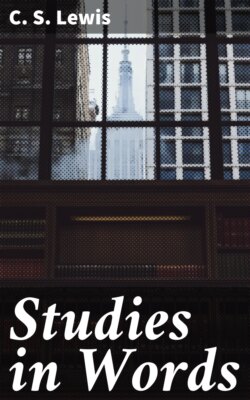Читать книгу Studies in Words - C. S. Lewis - Страница 7
На сайте Литреса книга снята с продажи.
III. THE DANGEROUS SENSE
ОглавлениеTable of Contents
When a word has several meanings historical circumstances often make one of them dominant during a particular period. Thus station is now more likely to mean a railway-station than anything else; evolution, more likely 13 to bear its biological sense than any other. When I was a boy estate had as its dominant meaning ‘land belonging to a large landowner’, but the meaning ‘land covered with small houses’ is dominant now.
The dominant sense of any word lies uppermost in our minds. Wherever we meet the word, our natural impulse will be to give it that sense. When this operation results in nonsense, of course, we see our mistake and try over again. But if it makes tolerable sense our tendency is to go merrily on. We are often deceived. In an old author the word may mean something different. I call such senses dangerous senses because they lure us into misreadings. In examining a word I shall often have to distinguish one of its meanings as its dangerous sense, and I shall symbolise this by writing the word (in italics) with the letters d.s. after it.
Thus, since ‘safety’ is the dangerous sense of the word security the symbol security (d.s.) would stand for ‘security in the sense of safety’. Similarly philosophy (d.s.) means ‘philosophy in the sense of metaphysics, epistemology, logic, etc. as distinct from the natural sciences’—the sense we are in danger of reading into it when old writers actually mean by it just science. Fellow (d.s.) would be ‘fellow used as a contemptuous vocative’.
When the dangerous sense is a sense which did not exist at all in the age when our author wrote, it is less dangerous. Moderate, and moderately increasing, scholarship will guard us against it. But often the situation is more delicate. What is now the dangerous sense may have existed then but it may not yet have been at all dominant. 14 It may possibly be the sense the old author really intended, but this is not nearly so probable as our own usage leads us to suppose. Our task is not the comparatively simple one of excluding an unqualified candidate; we have to conquer our undue predilection for one of those who are qualified.
